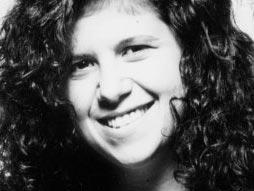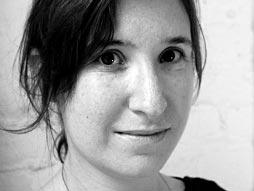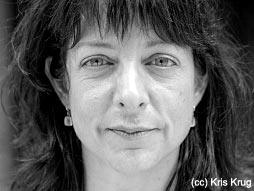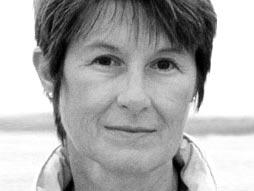Susan notes: Thanks to TED for making TED Talks downloadable and embeddable, and for providing the biographical information that goes along with them.
 Caroline Phillips cranks out tunes on a seldom-heard folk instrument: the hurdy-gurdy, a.k.a. the wheel fiddle. A searching, Basque melody follows her fun lesson on its unique anatomy and 1,000-year history.
Caroline Phillips cranks out tunes on a seldom-heard folk instrument: the hurdy-gurdy, a.k.a. the wheel fiddle. A searching, Basque melody follows her fun lesson on its unique anatomy and 1,000-year history.
Caroline Phillips' rich, soprano voice conjures up the far-and-wide cultures of the world, especially the sound and language of the Basque Country.
2010-09-20
Posted in TED Talks (Individual)
Susan notes: Thanks to TED for making TED Talks downloadable and embeddable, and for providing the biographical information that goes along with them.
 Rachel Sussman shows photographs of the world's oldest continuously living organisms -- from 2,000-year-old brain coral off Tobago's coast to an "underground forest" in South Africa that has lived since before the dawn of agriculture.
Rachel Sussman shows photographs of the world's oldest continuously living organisms -- from 2,000-year-old brain coral off Tobago's coast to an "underground forest" in South Africa that has lived since before the dawn of agriculture.
Rachel Sussman is on a quest to celebrate the resilience of life by identifying and photographing continuous-living organisms that are 2,000 years or older, all around the world.
For the past five years, Rachel Sussman has traveled around the globe photographing organisms that have lived for more than 2,000 years.
2010-09-06
Posted in TED Talks (Individual)
Aimee Mullins was born without fibular bones, and had both of her legs amputated below the knee when she was an infant. She learned to walk on prosthetics, then to run -- competing at the national and international level as a champion sprinter, and setting world records at the 1996 Paralympics in Atlanta.
1) Aimee Mullins On Running (February 1998)
In this TED archive video from 1998, paralympic sprinter Aimee Mullins talks about her record-setting career as a runner, and about the amazing carbon-fiber prosthetic legs (then a prototype) that helped her cross the finish line.
2010-09-03
Posted in TED Talks (Individual)
Susan notes: Thanks to TED for making TED Talks downloadable and embeddable, and for providing the biographical information that goes along with them.
 In the Gulf oil spill's aftermath, Lisa Margonelli says drilling moratoriums and executive ousters make for good theater, but distract from the issue at its heart: our unrestrained oil consumption. She shares her bold plan to wean America off of oil -- by confronting consumers with its real cost.
In the Gulf oil spill's aftermath, Lisa Margonelli says drilling moratoriums and executive ousters make for good theater, but distract from the issue at its heart: our unrestrained oil consumption. She shares her bold plan to wean America off of oil -- by confronting consumers with its real cost.
Director of the New America Foundation Energy Policy Initiative, Lisa Margonelli writes about the global culture and economy of energy.
2010-08-30
Posted in TED Talks (Individual)
Susan notes: Thanks to TED for making TED Talks downloadable and embeddable, and for providing the biographical information that goes along with them.
 Break down the oil slick, keep it off the shores: that's grounds for pumping toxic dispersant into the Gulf, say clean-up overseers. Susan Shaw shows evidence it's sparing some beaches only at devastating cost to the health of the deep sea.
Break down the oil slick, keep it off the shores: that's grounds for pumping toxic dispersant into the Gulf, say clean-up overseers. Susan Shaw shows evidence it's sparing some beaches only at devastating cost to the health of the deep sea.
For two decades, Susan Shaw has investigated the effects of environmental chemicals in marine animals. She is credited as the first scientist to show that flame-retardant chemicals in consumer products have contaminated marine mammals and commercially important fish stocks in the northwest Atlantic Ocean.
2010-08-30
Posted in TED Talks (Individual)
 Caroline Phillips cranks out tunes on a seldom-heard folk instrument: the hurdy-gurdy, a.k.a. the wheel fiddle. A searching, Basque melody follows her fun lesson on its unique anatomy and 1,000-year history.
Caroline Phillips cranks out tunes on a seldom-heard folk instrument: the hurdy-gurdy, a.k.a. the wheel fiddle. A searching, Basque melody follows her fun lesson on its unique anatomy and 1,000-year history. Rachel Sussman shows photographs of the world's oldest continuously living organisms -- from 2,000-year-old brain coral off Tobago's coast to an "underground forest" in South Africa that has lived since before the dawn of agriculture.
Rachel Sussman shows photographs of the world's oldest continuously living organisms -- from 2,000-year-old brain coral off Tobago's coast to an "underground forest" in South Africa that has lived since before the dawn of agriculture. In the Gulf oil spill's aftermath, Lisa Margonelli says drilling moratoriums and executive ousters make for good theater, but distract from the issue at its heart: our unrestrained oil consumption. She shares her bold plan to wean America off of oil -- by confronting consumers with its real cost.
In the Gulf oil spill's aftermath, Lisa Margonelli says drilling moratoriums and executive ousters make for good theater, but distract from the issue at its heart: our unrestrained oil consumption. She shares her bold plan to wean America off of oil -- by confronting consumers with its real cost. Break down the oil slick, keep it off the shores: that's grounds for pumping toxic dispersant into the Gulf, say clean-up overseers. Susan Shaw shows evidence it's sparing some beaches only at devastating cost to the health of the deep sea.
Break down the oil slick, keep it off the shores: that's grounds for pumping toxic dispersant into the Gulf, say clean-up overseers. Susan Shaw shows evidence it's sparing some beaches only at devastating cost to the health of the deep sea.